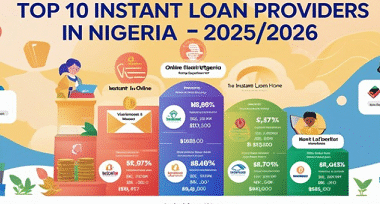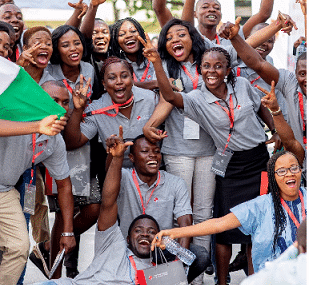Student Loan Forgiveness Application 2025/2026
Introduction
For many Nigerian students studying at home or abroad, education funding often requires financial aid, scholarships, or student loans. As tuition costs increase in countries like the United States, United Kingdom, and Canada, student loan burdens can become overwhelming especially when post-graduation employment is uncertain.
Fortunately, several international and local programs offer student loan forgiveness or repayment assistance, particularly in 2025/2026 when new reforms are taking place. This guide will help you understand:
-
What student loan forgiveness means
-
Who qualifies (especially as a Nigerian)
-
How to apply for forgiveness in different countries
-
Key updates for 2025/2026
-
Local alternatives and what to expect
What Is Student Loan Forgiveness?
Student loan forgiveness is a policy or program that cancels part or all of your educational loan debt if you meet specific conditions, such as:
-
Working in public service
-
Proving economic hardship
-
Experiencing school closure or fraud
-
Disability or death (in special cases)
Forgiveness programs are mostly offered by foreign governments, especially where Nigerian students have studied with loans (e.g., the U.S. Department of Education). In Nigeria, loan forgiveness is rare but can occur under certain scholarship conditions, or through government waivers.
Key Student Loan Forgiveness Programs Available to Nigerians
A. U.S. Federal Loan Forgiveness Programs (For Nigerians Studying in the U.S.)
If you studied in the United States on a federal student loan (such as Direct Subsidized, Unsubsidized, or PLUS loans), you may qualify for:
i. Public Service Loan Forgiveness (PSLF)
-
Available after 120 monthly payments (10 years)
-
Requires employment in a non-profit or government job (including international NGOs)
-
Must be on a qualifying Income-Driven Repayment Plan (IDR)
Relevance to Nigerians:
Nigerians working for UN agencies, embassies, or NGOs abroad may qualify, especially if they are U.S. degree holders with federal loans.
ii. Income-Driven Repayment (IDR) Forgiveness
-
Repayment based on income (10–20% of discretionary income)
-
Forgiveness after 20–25 years depending on the plan
-
Updated in 2025 due to policy changes under the Biden administration
Important Update:
Due to recent court rulings in the U.S., IDR forgiveness is currently limited to IBR, PAYE, and ICR plans. The popular SAVE plan is paused for new applicants.
iii. Teacher Loan Forgiveness
-
Up to $17,500 forgiven for teachers in underserved schools
-
Requires five years of full-time teaching
-
Available for U.S. loans only
B. UK Student Loan Forgiveness (Nigerians in the UK)
If you studied in the UK under the Student Loan Company (SLC) via Plan 1, 2, or 4 loans, forgiveness is automatic after:
-
30 years for Plan 2
-
25 years for Plan 4
-
Once you reach retirement age or become permanently disabled
Eligibility for Nigerians:
You must have taken the loan under a UK undergraduate or postgraduate scheme. Repayments are based on your UK or international income, and forgiveness is automatic after the expiry period even if you’re now in Nigeria.
C. Canadian Loan Forgiveness (For Health Professionals and Rural Workers)
Canada offers loan forgiveness to health workers and teachers who work in underserved areas. Though typically for citizens and residents, Nigerians who obtain Permanent Residency (PR) may qualify for forgiveness if they practice medicine or nursing in rural communities.
Student Loan Forgiveness Application 2025/2026
2025/2026 Student Loan Forgiveness Policy Updates (Global Focus)
United States
-
As of March 2025, IDR application portals reopened (IBR, PAYE, and ICR only)
-
PSLF processing is now faster, but SAVE plan forgiveness is paused
-
Starting January 1, 2026, forgiveness under IDR plans will be taxable unless new tax laws extend current exemptions
-
PSLF and Teacher Forgiveness remain tax-free
-
New “Repayment Assistance Plan (RAP)” will replace IDRs for new borrowers starting July 2026
United Kingdom
-
From 2025, UK graduates must report international income more accurately, as HMRC tightens monitoring for borrowers outside the UK (including Nigerians)
-
Forgiveness timelines remain unchanged: Plan 2 forgiven after 30 years
Canada
-
Forgiveness for PR holders and doctors expanded in Northern and rural regions
-
Government may review forgiveness rules by late 2026
Can Nigerians Apply for Forgiveness from Nigeria?
Yes but only if:
-
You studied abroad and received a government-issued or federal student loan
-
You maintain your repayment account or access to a foreign loan servicing platform (like FedLoan or SLC)
-
You meet program-specific conditions
What You Need to Apply
-
Student loan account login (FedLoan, SLC, NSLDS)
-
Proof of employment (especially for PSLF)
-
Income certification or tax records
-
Government-issued ID and school records
-
Updated contact details in your loan account
Nigerian Loan Relief: What Are the Local Options?
While Nigeria doesn’t yet offer student loan forgiveness, here are some alternatives:
i. Nigerian Education Bank Student Loan (2024 Launch)
-
Announced in 2024 under the Students Loan Act
-
Offers interest-free loans for tertiary education
-
Loan repayment starts 2 years after NYSC
-
Forgiveness not yet legislated, but possible waivers may come in future revisions
ii. TETFund and PTDF Scholarships
-
Not loans, but fully funded scholarships
-
No repayment required unless bond terms are violated
iii. State-sponsored foreign scholarships
Some states offer scholarships for study abroad (e.g., Kaduna, Lagos), but these are grants, not loans.
Step-by-Step Guide to Applying for Forgiveness (International Loans)
Step 1: Identify Your Loan Type
Check if your loan is:
-
U.S. Federal (Direct Subsidized/Unsubsidized/PLUS)
-
U.K. SLC Plan 1/2/4
-
Canadian Provincial Loan
-
Private loans (rarely forgiven)
Step 2: Check Program Eligibility
-
PSLF: Nonprofit/public job? Apply through StudentAid.gov
-
IDR: Enroll in a repayment plan (IBR/PAYE/ICR)
-
UK: Wait for 25–30 years (automatic write-off)
-
Canada: Work in eligible job/location
Step 3: Submit the Application
-
U.S.: Use studentaid.gov
-
U.K.: Loan is written off automatically just keep address and earnings updated with SLC
-
Canada: Use the National Student Loans Service Centre (NSLSC) portal
Step 4: Monitor Status and Recertify Annually
Especially important for IDR and PSLF applications delays may affect credit history or deferment.
Testimonials From Nigerians Who Benefited
Oluwaseun A. – United States
“After completing my MPH in Boston and working with a nonprofit in Nigeria, I qualified for PSLF. Ten years later, my $65,000 loan was completely forgiven. The process was tough, but worth it.”
Chioma E. – United Kingdom
“I’ve been repaying my UK Plan 2 loan for years. Now based in Lagos, I only pay if I earn above their threshold. At 50, the rest will be written off.”
Dr. Ibrahim S. – Canada
“As a PR in Alberta working in a rural hospital, I received partial loan forgiveness through Canada’s Medical Repayment Assistance Plan.”
Student Loan Forgiveness Application 2025/2026
FAQs
Q1. Can Nigerian-based applicants apply for U.S. student loan forgiveness?
Yes, if you have a federal loan and meet all criteria. You must maintain your account with accurate contact details.
Q2. Is Nigerian Education Bank forgiveness available?
As of now, no. But future amendments to the Students Loan Act may allow conditional waivers.
Q3. Are private loans eligible for forgiveness?
Rarely. Private lenders have stricter terms and usually do not offer forgiveness except under extreme hardship.
Conclusion
Student loan forgiveness can be life-changing especially for Nigerians who studied abroad and are managing international debts. Whether through U.S. federal relief, UK automatic write-offs, or Canadian employer-linked forgiveness, there are clear pathways in 2025/2026.
While local forgiveness programs are still evolving, Nigerians should remain informed, take advantage of existing programs abroad, and monitor updates from local education authorities. The right action taken now such as submitting a PSLF form or enrolling in IBR can result in complete debt cancellation over time.




